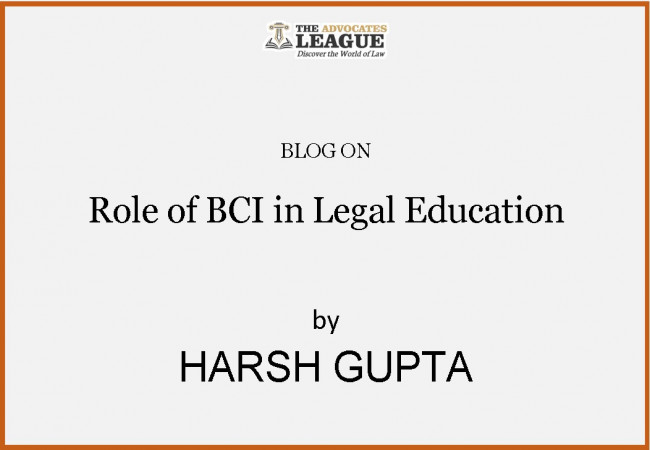Role of BCI in Legal Education

Introduction-
In this piece of writing the author
tries to bring to the table the relationship between legal education and the
bar council of India and the impact and role BCI plays in legal education in
India. To start with, what is the bar council of India? It is a statutory body constituted by
parliament under the advocates’ record act, 1961. Now, the author emphasizes
the objective behind the formation of such a body and then tries to relate it
with legal education and the role it plays!
Objectives
of BCI-
The main purpose of constituting the
statutory body by parliament was to set, define and allocate standards to the
bar regarding professional conduct, etiquettes and disciplinary jurisdiction
and it also set standards for legal education regarding important course circular,
syllabus of the course, eligibility criteria for applying in higher studies in
the field of law, the conduct of examination, marking criteria, etc.[1]. as
we all are aware of the famous saying that – ‘law is very dynamic, it changes
with time’ which means there may be a law which is not appropriate today and it
is in bad shape but tomorrow it may change subject to change in the social
order, people’s thinking and mindset and society, so the whole process of
change in the position of law in terms of validity can be termed as ‘legal
reform’. Now as a prudent man a question can come to the reader’s mind that why
the author is referring to legal reforms- it is because when law colleges will
follow the standards set by BCI regarding imparting theoretical and practical
knowledge by way of conducting proper academic classes, moot courts, mock trial
courts, extracurricular activities, law assignments, seminars, webinars, debate
completion for holistic development of a law student, then they are bringing reforms
within the institution and when a student gets all exposure he/she needs to
become an efficient lawyer and advocate,
the objectives of BCI in the field of legal educations get fulfilled.
Reality
check of progress in legal education and role played by BCI-
There are various committees within
the BCI, one such committee is the legal education committee[2]
which consists of five members from the union law ministry, and judiciary,
university grant commission, academia and five members of the bar council of India.
The committee functions to make recommendations to the bar council of India
regarding setting up of standards of legal education in universities, to visit
the colleges to ensure due compliance of the standards laid down by BCI and
after inspection, it has been found that law faculty’s infrastructure, library
access, faculty credentials are not up to the mark regarding qualifications,
the BCI has the power to discredit the license issued to the law college or
university after proper investigation. Recently Delhi high court ordered BCI to
inspect the irregularities at faculty of law, JAMIA HAMDARD UNIVERSITY, NEW
DELHI after a person filed a petition for the same where allegations were made
regarding the qualification of the dean and other faculties.[3]
There are some grey areas that need
to be solved, this is what reality check is all about, those who are associated
with the law profession are very well aware of debate regarding NLU and non-NLU
colleges, people mainly the law firm associates reject law students if they are
not from NLU, doesn’t matter how hard a person worked, how many internships he
did, so here tag of an NLU student dominates overall hard work and talent if
another person doesn’t come from NLU, so BCI should look into a universal way of
imparting legal education without any prejudice to anybody, private colleges
should be held more accountable as NLUs are few in our country, so major chunk
is the private sector where BCI should focus more.
Another grey area is a method of
teaching to impart legal education among students, the law is more practical
than theoretical, but colleges are busy and thus restricted themselves to
completion of the syllabus in any manner possible, BCI is somehow inefficient
to tackle the issues of practical learning as they believe in university
authorities and we all know how good manipulators they are! So, BCI should
employ a member for every law college all over India who will report to the
council every month and university should pay his/her fees and post should be
based on a rotation policy of six months, it will lead to the smooth
functioning of law school in terms of both theoretical and practical learning.
Conclusion-
Nobody can deny that the
establishment of national law universities has paved the way for India to
become a world leader when it comes to solving the disputes of clients at the
national and international level, these institutes have represented India at
the worlds rankings but at the same time we cannot deny the pathetic condition
of Indian private unaided law institutions when it comes to imparting legal
education, the current phase is of globalization which means transnational
issues which a lawyer has to deal with, so the law cannot be seen in isolation[4] and
with the advent of new cyber laws, air and space laws, drone laws, it's the
laws, opportunities are bound to come, for this we have to be trained in that
particular manner, lawyers will need to tackle multi issues at one given point
of time, it's only possible if BCI takes important steps to tackle those
nuances.
[1] ACER, Microsoft Word - BAR COUNCIL OF INDIA.docx, (June
9, 2021, 12:07 AM)
http://indianbarassociation.org/wp-content/uploads/2013/12/BAR-COUNCIL-OF-INDIA1.pdf
[2] id At 4
[3] ANI, Delhi HC directs BCI to inspect Jamia
Hamdard's law school, ANI, (June
9, 2021, 12:53 AM)
[4] Krushna Chandra Jena, ROLE OF BAR COUNCILS AND UNIVERSITIES FOR
PROMOTING LEGAL EDUCATION IN INDIA, 44(4) Journal of the Indian Law
Institute 555,567 (2002)
http://www.jstor.org/stable/43951843
